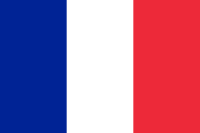 France (/ˈfræns/ franss or /ˈfrɑːns/ frahnss; French pronunciation: [fʁɑ̃s]), officially theFrench Republic (French: République française, pronounced: [ʁepyblik fʁɑ̃sɛz]), is a state in Western Europe with several overseas territories and islands located on other continents and in the Indian, Pacific, and Atlantic oceans. Metropolitan France extends from the Mediterranean Sea to the English Channeland the North Sea, and from the Rhine to the Atlantic Ocean. It is often referred to as L’Hexagone (“The Hexagon”) because of the geometric shape of its territory. It is bordered (clockwise starting from the northeast) by Belgium, Luxembourg, Germany, Switzerland, Italy and Monaco; with Spain and Andorra to the south. France is linked to the United Kingdom by the Channel Tunnel, which passes underneath the English Channel.
France (/ˈfræns/ franss or /ˈfrɑːns/ frahnss; French pronunciation: [fʁɑ̃s]), officially theFrench Republic (French: République française, pronounced: [ʁepyblik fʁɑ̃sɛz]), is a state in Western Europe with several overseas territories and islands located on other continents and in the Indian, Pacific, and Atlantic oceans. Metropolitan France extends from the Mediterranean Sea to the English Channeland the North Sea, and from the Rhine to the Atlantic Ocean. It is often referred to as L’Hexagone (“The Hexagon”) because of the geometric shape of its territory. It is bordered (clockwise starting from the northeast) by Belgium, Luxembourg, Germany, Switzerland, Italy and Monaco; with Spain and Andorra to the south. France is linked to the United Kingdom by the Channel Tunnel, which passes underneath the English Channel.
France is a founding member state of the European Union and is the largest one by area. France has been a major power for several centuries with strong cultural, economic, military and political influence in Europe and in the world. During the 17th and 18th centuries, France colonised great parts of North America; during the 19th and early 20th centuries, France built the second largest empire of the time, including large portions of North, West and Central Africa, Southeast Asia, and many Pacific islands.
France is a unitary semi-presidential republic with its main ideals expressed in the Declaration of the Rights of Man and of the Citizen. France is one of the most developed countries and possesses the fifth largest economy by nominal GDP and seventh largest economy by purchasing power parity. France enjoys a high standard of living as well as a high public education level, and has also one of the world’s highest life expectancies. It is the most visited country in the world, receiving 82 million foreign tourists annually. France is a founding member of the United Nations, and a member of the Francophonie, the G8, G20, NATO, OECD, WTO, and the Latin Union. It is one of the five permanent members of the UN Security Council and possesses the third largest nuclear weapons stockpile in the world with about 300 active warheads as of May 25 2010. In 2009, France was listed 8th on the Human Development Index and 24th on the Corruption Perception Index.
France has been a center of cultural creation for centuries. Many French artists have been among the most renowned of their time, and France is still much recognized and admired in the world for its very rich cultural tradition.
The successive political regimes have always promoted artistic creation, and the creation of the Ministry of Culture in 1959 helped preserve the cultural heritage of the country and make it available to public. The Ministry of Culture has been very active since its creation, granting subsidies to artists, promoting French culture in the world, supporting festivals and cultural events, protecting historical monuments. The French government also succeeded in maintaining a cultural exception to defend audiovisual products made in the country.
France is the country that receive the highest number of tourists per year, largely thanks to the numerous cultural establishments and historical buildings implanted all over the territory. It counts 1,200 museums welcoming more than 50 million people annually. The most important cultural sites are run by the government, for instance through the public agency Centre des monuments nationaux, which have around hundred national historical monuments at charge. The 43,180 buildings protected as historical monuments include mainly residences (many castles, or châteaux in French) and religious buildings (cathedrals,basilicas, churches, etc), but also statutes, memorials and gardens.
France is one of the world’s major economic powers. Agriculture plays a larger role than in the economies of most other industrial countries. A large proportion of the value of total agricultural output derives from livestock (especially cattle, hogs, poultry, and sheep). The mountain areas and NW France are the livestock regions. The country’s leading crops are wheat, sugar beets, corn, barley, and potatoes, with the most intensive cultivation N of the Loire; the soil in the Central Massif is less fertile. Fruit growing is important in the south. France is among the foremost producers of wine in the world. The best-known vineyards are in Burgundy, Champagne, the Rhône and Loire valleys, and the Bordeaux region. The centers of the wine trade are Bordeaux, Reims, Épernay, Dijon, and Cognac.
Notes from Wikipedia and Answers.com









